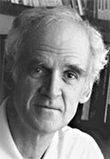Charles Taylor Receives 2014 Martin E. Marty Award for the Public Understanding of Religion
On behalf of the Committee on the Public Understanding of Religion, it is my great pleasure to announce Charles Taylor will receive the 2014 Martin E. Marty Award for the Public Understanding of Religion.
The award recognizes extraordinary contributions to the public understanding of religion by individuals whose work has a relevance and eloquence that speaks not just to scholars but more broadly to the public as well. We honor Professor Taylor for his profound and influential scholarship as well as his many contributions to public discourse and political life.

Taylor’s work will be well known to the AAR membership. Over a fifty-three year academic career, Taylor has written probing and magisterial works on moral and political thought cutting across a range of disciplines. His work has paid significant attention to the role of religion in individual and social life and addressed theological themes and issues in novel ways. Among his many books are works on Hegel’s philosophy and its continuing relevance for social and political thought. Much of Taylor’s work over the course of his career addresses questions of modern modes of identity, situating theological and religious views of the self and society within the broader sweep of modernity and the emergent visions of identity in the social sciences. His influential Sources of the Self, for example, “is an attempt to articulate and write a history of the modern identity . . . what it is to be a human agent: the senses of inwardness, freedom, individuality, and being embedded in nature . . . in the modern West.”[1]
Taylor’s work also engages the depth of the transformations of modernity, changes that have disrupted earlier modes of moral, religious, social, and political life while opening new synthetic possibilities. Hans Joas describes how, in A Catholic Modernity, “Taylor attempts to look at our modern civilization . . . as ‘another of those great cultural forms that have come and gone in human history’; he invites us to think about ‘what it means to be a Christian here, to find our authentic voice in the eventual Catholic chorus.’” Taylor describes this new horizon for life that is both modern and religious:
In modern, secularist culture there are mingled together both authentic developments of the gospel, of an incarnational mode of life, and also a closing off to God that negates the gospel. The notion is that modern culture, in breaking with the structures and beliefs of Christendom, also carried certain facets of Christian life further than they ever were taken or could have been taken within Christendom. In relation to the earlier forms of Christian culture, we have to face the humbling realization that the breakout was a necessary condition of the development.[2]
Most recently, Taylor’s magnum opus, A Secular Age, has challenged many reigning assumptions about secularization and the disenchantment of our lives under modernity. Taylor’s goal is to map out and rethink the implications of fundamental philosophical and theological changes in the West: “The change I want to define and trace is one which takes us from a society in which it was virtually impossible not to believe in God, to one in which faith, even for the staunchest believer, is one human possibility among others.”[3] As John Patrick Diggins described in his review of the book:
Taylor argues against the “subtraction stories” of modernity, in which religious belief and other “confining horizons” are “sloughed off,” leaving the mind without faith or piety. Instead, he argues, “Western modernity, including its secularity, is the fruit of new inventions, newly constructed self-understandings and related practices, and can’t be explained in terms of perennial features of human life.” Even the old distinction between the sacred and the profane has taken on new meaning. Instead of disappearing, God is now “sanctifying us everywhere,” including “in ordinary life, our work, in marriage, and so on.”
While Taylor’s work is massively impressive and relevant to every facet of the scholarship of AAR members, the Marty Award is not a lifetime scholarly achievement award. We certainly honor Taylor for advancing a deeper understanding about the developments of modernity in the West and the ways that religious thought and life practices continue to be transformed.
At the same time we honor him for the ways that he has brought these reflections to bear upon public discourse and political life. Taylor has consistently directed his intellectual work toward audiences beyond philosophers and theologians, dialoguing with a wider public—other disciplines and the public beyond the academy—about the role of religion in history, society, and thought and about the possibilities for religious life under the conditions of modernity.
These concerns have motivated Taylor’s public, political engagement. From the start of his career, Taylor’s ambitions have not been exclusively academic. Not long after receiving his BA, MA, and DPhil degrees from University of Oxford (where he was a Rhodes Scholar), Taylor sought election four times (1962–68) to the Canadian House of Commons as member of the social democratic New Democratic Party in Mount Royal. While never winning more than second place, this deep interest in public life, especially in his home province of Quebec, continued throughout his career.
In 1991, Taylor was named as the Massey Lecturer for the Canadian Broadcasting Company and delivered a series of talks on CBC Radio, under the title “The Malaise of Modernity,” addressing in a publicly accessible format the shape and sources of the authentic self and various challenges to this project posed by modern life. The lectures became his book, The Ethics of Authenticity (Harvard University Press, 1992).
Most importantly, in 2007 he was appointed as the copresident of the Commission de Consultation sur les Pratiques d’Accommodement Reliées aux Différences Culturelles (CCPARDC), which addressed two growing concerns: the proper role of religion in the Quebec public sphere and how requests for public accommodations of religious practice might be handled in a liberal, multicultural society. A chapter of the CCPARDC report became a volume, Secularism and Freedom of Conscience, that Taylor coauthored with Jocelyn Maclure. In it, Taylor and Maclure make a bold defense for secularism as a way for citizens to achieve equality of respect and freedom of conscience within a liberal, plural order. Secular societies can include a diversity of beliefs and practices while also allowing reasonable accommodations for religious practices. Their “liberal-pluralist model . . . sees secularism as a mode of governance whose function is to find the optimal balance between respect for moral equality and respect for freedom of conscience. A liberal secular regime will not take exception to the mere presence of the religious in the public space and will accept the necessity of resorting to accommodations aimed at restoring equity or at allowing the exercise of freedom of religion, as long as the principle of equal respect is not compromised.”[4]
Finally, a full biography is in order. McGill University, where Taylor has had his intellectual home for most of his career, captures well the highlights and spirit of Taylor’s work thus far:
One of the most important thinkers Canada has produced, Charles Taylor (BA ‘52) is that rare philosopher who attempts to put his ideas into practice. His writings have been translated into 20 languages, and have covered a range of subjects that include artificial intelligence, language, social behaviour, morality and multiculturalism. A pupil of Isaiah Berlin at Oxford, Taylor taught at McGill from 1961 to 1997, and is now a professor emeritus. A public intellectual, Taylor never hesitated to make his ideas known—he ran in three federal elections, most famously against Pierre Trudeau in 1965.
Sources of the Self, his 1989 book, achieved a wide general readership. His former mentor, Isaiah Berlin, said of him, “whatever one may think of his central beliefs, [they] cannot fail to broaden the outlook of anyone who reads his works or listens to his lectures or, indeed, talks to him.”
In 2003, Taylor was awarded the first Social Sciences and Humanities Research Council Gold Medal. In 2007, he was again in the public eye, this time for three different accomplishments: He received the prestigious Templeton Prize for Progress Toward Research or Discoveries about Spiritual Realities, the world’s largest annual monetary award for an individual; he joined forces with sociologist Gérard Bouchard to chair the high-profile Consultation Commission on Accommodation Practices Related to Cultural Differences, the Quebec government’s response to a string of controversies surrounding the “reasonable accommodation” of religious groups; and he published A Secular Age, a study of the changing place of religion in our societies, which the New York Times hailed as “a work of stupendous breadth and erudition.” In November 2008, Taylor became the first Canadian to win Japan’s Kyoto Prize for arts and philosophy, an achievement marked by a ten-day lecture tour of Japan. He is also a member of the Order of Canada. Today, Taylor continues to write and lecture extensively, especially on multiculturalism and secular society.
“We don’t adequately understand our own development in what we call modernity in the West, and we fail to see that this development is not occurring in the rest of the world," Taylor has said. "We can’t really understand the difference until we understand better what’s happened in our civilization.”
We are thrilled that Professor Taylor will join us at the 2014 Annual Meeting in San Diego. We hope you will join us for the Marty Forum, where Taylor will discuss themes of his work with Professor Miroslav Volf of Yale.
Congratulations, Professor Charles Taylor!
Michael Kessler, Georgetown University
Chair, Committee on the Public Understanding of Religion
[1] Charles Taylor, Sources of the Self: The Making of Modern Identity (Cambridge: Harvard University Press, 1989), ix.
[2] Charles Taylor, “A Catholic Modernity?” A Catholic Modernity?: Charles Taylor's Marianist Award Lecture (Oxford University Press, 1999), 14–15.
[3] Charles Taylor, A Secular Age (Belknap Press/Harvard University Press, 2007), 3.
[4] Jocelyn Maclure and Charles Taylor, Secularism and Freedom of Conscience, trans. Jane Marie Todd (Cambridge: Harvard University Press, 2011), 34.






